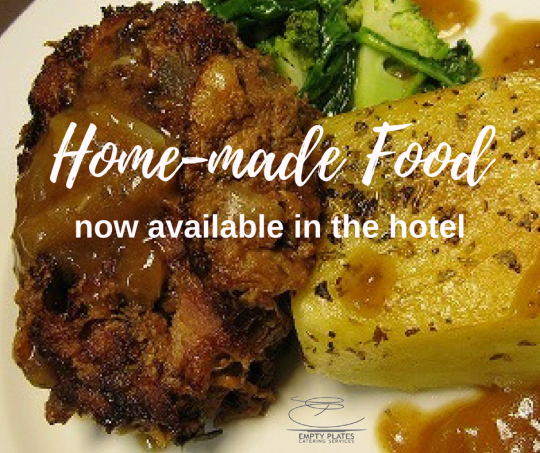
Traditional room service is becoming a service fewer travelers are demanding.
Instead, they are looking to be able to order food the way they do at home. And hotels are responding by forming partnerships with food-delivery services such as Peapod and Grubhub.
Hawthorn Suites by Wyndham late last year introduced Homemade @ Hawthorn, an in-room cooking program enabling guests to make easy meals. New York chef Hari Nayak and Top Chef competitor James Rigato have created an e-cookbook of recipes for the brand.
In May, the company launched a pilot program letting guests get groceries delivered to their rooms from Instacart and Peapod.
Hyatt Centric has partnered with food-ordering company Grubhub to let guests order from restaurants selected by hotel employees. Orders can be made through a customized landing page.
Residence Inn, part of Marriott International, leaves guests grocery-request forms in their suites. Employees will shop for the requested items, which are added to the final bill with no mark-ups. The rooms have fully equipped kitchens including refrigerators, microwave ovens and dishwashers.
Hoteliers say they are responding to travelers who crave an experience that resembles their home life. The popularity of cooking competition shows has also made many people enjoy the art of making their own meals.
A survey from Hawthorn Suites found that 66% of Americans believe being able to cook in their hotel room would make them feel more at home while traveling. Millennials — those travelers in their 20s and early 30s — were more likely to want to cook, according the survey.
“Our Millennial travelers are really excited about cooking and they like to cook in their normal lives,” says Diane Mayer, vice president and global brand leader of Residence Inn. “Growing up, they’ve been watching cooking competitions and they are into celebrity chefs. They view cooking as a form of relaxation and a form of entertainment.”
Online grocery-delivery services have also been on the rise. Last year, U.S. consumers spent an estimated $42 billion online in groceries in 2016, up more than 160% over 2015, according to Morgan Stanley. Industry experts believe the segment has the potential to grow substantially over the next decade with American consumers spending more than $100 billion on online groceries by 2025.
At the same time, traditional room service has not been a money-maker for hotels, and many have decided to suspend it. Travelers, meanwhile, have balked at prices for room service. According to the American Hotel and Lodging Association, 37% of hotels offered room service in 2014 vs. 22% in 2016. Meanwhile, 71% of luxury hotels offered alternatives to room service last year.
“Room service can be complicated and expensive to operate well,” says Chekitan Dev, a professor at Cornell University’s School of Hotel Administration. “In areas where there are local restaurants that can deliver a variety of food (like) New York City or where grocery delivery is readily available, it makes sense to outsource in-room dining to third parties.”
Some Hilton brands have moved toward pantry-style grab-and-go markets in their lobbies as an alternative. The shops offer hot or cold sandwiches, salads, snacks and sometimes beer and wine.
“Over the years, there has been a systemic shift in guests’ expectations of hotel food and beverage offerings,” says Jonathan Wilson, vice president of product innovation and brand services for Hilton. “There are guests who want a quick burger or salad delivered to their room though just as many might prefer a communal table where they can sit on their laptop and order a flat white or local beer or to be able to purchase something hot or cold from an in-hotel market.”
Even travel review website TripAdvisor has gotten into the food-delivery game, and has integrated Grubhub into its website in the USA and Canada. It recently also aligned itself with London-based Deliveroo to expand globally.
The food-delivery services are much more practical in extended-stay properties that have kitchens, which in general is a rapidly growing segment in the industry.
Larry Hambro, vice president of brand operations for Hawthorn Suites, says 15% to 30% of the brand’s guests stay there 30 nights or longer.
“Convenience is key for long-term travelers, especially when they are in an unfamiliar city,” he says. “How often can you eat out? It’s expensive to eat at a hotel. I don’t care if you’re on a per diem. It gets expensive.”
Hambro says some hotels have even organized cooking competitions among guests. Chefs Nayak and Rigato have created hearty, easy recipes, he says.
“These guys have created recipes you can cook in a mug,” he says.
Article originally published by Nancy Trejos for USA Today on 14th August 2017